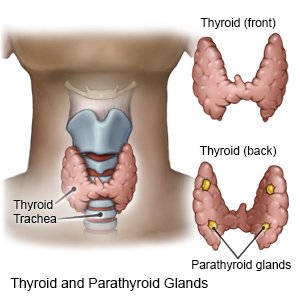Hypercalcemia
Medically reviewed by Drugs.com. Last updated on Aug 4, 2025.
Hypercalcemia is a high level of calcium in your blood. Calcium levels are kept in balance by your parathyroid glands. Your parathyroid glands are located in your neck near your thyroid gland.
 |
DISCHARGE INSTRUCTIONS:
Medicines:
- Medicines may be given to help lower your calcium level or to treat the cause of your hypercalcemia.
- Take your medicine as directed. Contact your healthcare provider if you think your medicine is not helping or if you have side effects. Tell your provider if you are allergic to any medicine. Keep a list of the medicines, vitamins, and herbs you take. Include the amounts, and when and why you take them. Bring the list or the pill bottles to follow-up visits. Carry your medicine list with you in case of an emergency.
Follow up with your healthcare provider as directed:
Write down your questions so you remember to ask them during your visits.
Related medications
Treatment options
The following list of medications are related to or used in the treatment of this condition.
Self-care:
- Drink liquids as directed. Liquids will help prevent dehydration and kidney stones. Ask your healthcare provider how much liquid to drink each day and which liquids are best for you.
- Follow your healthcare provider's advice on ways to stay active. Activity can help prevent your hypercalcemia from getting worse.
Contact your healthcare provider if:
- You feel confused, or you have trouble concentrating.
- You have symptoms of dehydration, such as increased thirst, dark yellow urine, and little or no urine.
- You have new or worsening symptoms.
- You have questions or concerns about your condition or care.
Return to the emergency department if:
- You feel fluttering or jumping in your chest.
- You feel like you are going to pass out.
- You have nausea and you are vomiting.
- You have pain in the middle of your back that moves across to your side, or that spreads to your groin.
© Copyright Merative 2025 Information is for End User's use only and may not be sold, redistributed or otherwise used for commercial purposes.
The above information is an educational aid only. It is not intended as medical advice for individual conditions or treatments. Talk to your doctor, nurse or pharmacist before following any medical regimen to see if it is safe and effective for you.
Learn more about Hypercalcemia
Treatment options
Care guides
Further information
Always consult your healthcare provider to ensure the information displayed on this page applies to your personal circumstances.
